By Tom Tracy - Florida Catholic
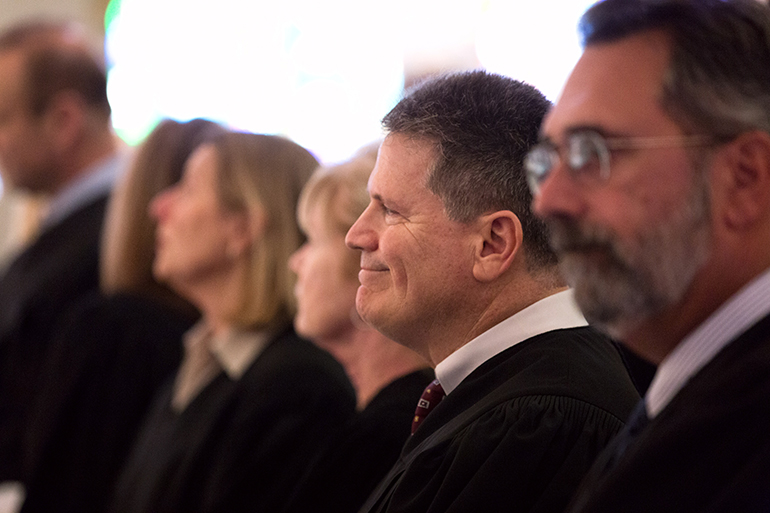
Photographer: TOM TRACY | FC
Judges, attorneys and elected officials joined Miami Archbishop Thomas Wenski April 27 at St. Anthony Parish in Fort Lauderdale for the 28th annual Red Mass of the St. Thomas More Society of South Florida.
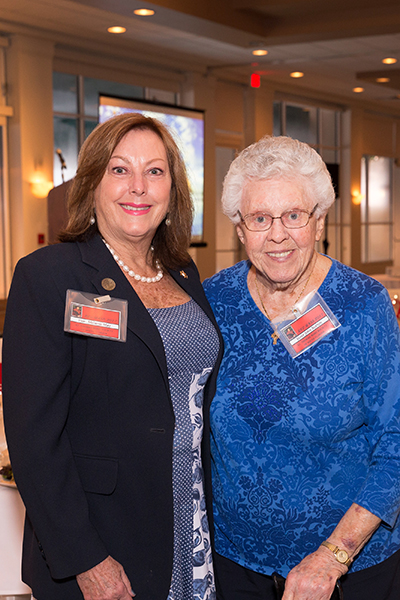
Photographer: TOM TRACY | FC
Keynote speaker Judge Melanie May, left, poses with Adrian Dominican Sister John Norton, retired from St. Thomas Aquinas High School in Fort Lauderdale, where May taught before entering the legal profession. Judge May was the keynote speaker at the banquet that followed the 28th annual Red Mass of the St. Thomas More Society of South Florida.
FORT LAUDERDALE | Her first professional job out of college was teaching at St. Thomas Aquinas High School � just miles away from where the St. Thomas More Society of South Florida invited now-Judge Melanie May to deliver a keynote address.
Judge May talked about her own personal journey and gave some examples of legal-ethical dilemmas throughout history at the banquet that followed the Society’s annual Red Mass for the local legal community � lawyers, judges and elected officials.
The Mass was celebrated April 27 at St. Anthony Church in Fort Lauderdale by Archbishop Thomas Wenski. A dinner and awards reception took place afterward at the nearby Pier 66 Hyatt Hotel.
This year, the annual Archbishop Edward A McCarthy Award was presented to retired Msgr. James R. Dixon, a past Catholic chaplain in the U.S. Air Force and local resident who was unable to attend due to illness.
Previous speakers at the St. Thomas More Society event include four university presidents, a past Florida governor, a U.S. Senator, a cardinal, three federal appellate judges and U.S. Supreme Court justices Clarence Thomas and the late Antonin Scalia.
Judge May, of the Florida Fourth District Court of Appeals in West Palm Beach, is a graduate of both Florida Atlantic University in Boca Raton and Nova Law Center in Fort Lauderdale. She began her remarks by noting that she has been “blessed to have so many Catholics in her life” although she was raised Episcopalian.
She thanked Msgr. Vincent Kelly, longtime supervising principal at St. Thomas Aquinas, for giving her the opportunity to work in Catholic education before starting her legal career.
“The four years at St. Thomas Aquinas were truly four of the most wonderful years of my life because of the wonderful people I had the opportunity to work with,” Judge May said. She went on to clerk with Judge Peter T. Fay, of the United States Court of Appeals for the Eleventh Circuit and a past Red Mass speaker, as well as James McDonough, secretary of the Florida Department of Corrections from 2006 to 2008.
“When we graduate from law school we really all try to be someone like Atticus Finch out of ‘To Kill a Mockingbird,’ but sometimes the choices we make require us to adhere to the rule of law” while trying to do the right thing, Judge May said, noting the challenges facing legal professionals.
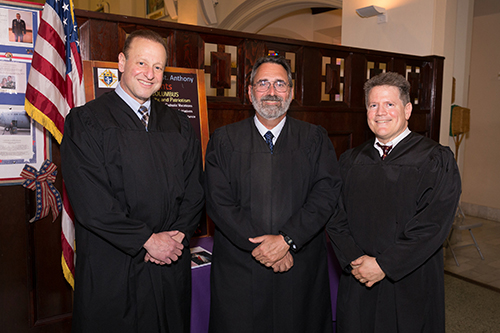
Photographer: TOM TRACY | FC
Judges Barry Seltzer, William DiMitrouleas and David Haimes were among the legal professionals who gathered at St. Anthony Parish in Fort Lauderdale for the 28th annual Red Mass of the St. Thomas More Society of South Florida.
She talked about the lives of three notable legal professionals, including St. Thomas More of England, the society’s namesake and an early proponent of criminal justice reform. He tried to get rid of the death sentence for petty theft crimes.
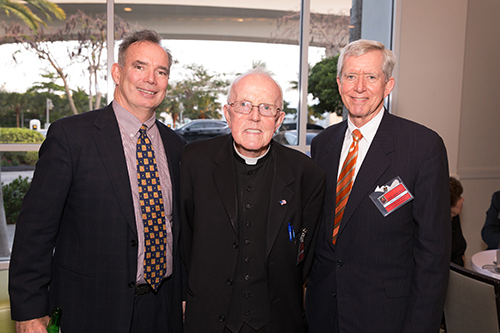
Photographer: TOM TRACY | FC
John Buckley, Father Anthony Mulderry, pastor of St. Gabriel Church in Pompano Beach, and Albert Massey pose for a photo before the banquet that followed the annual Red Mass of the St. Thomas More Society of South Florida.
“His unwillingness to abandon God’s law, to not kneel to King Henry’s demands, was his choice,” Judge May said.
She also noted the failure of Germany’s legal and judicial community to oppose Adolph Hitler’s Nazi leadership and laws, calling it a legal history lesson for the ages.
“In this example of choice, too, judges adhered to the rule of law notwithstanding that it was not the right thing to do, unlike Thomas More who refused to accept King Henry’s laws,” Judge May said. She added that many judges who blindly followed Hitler's new laws were put on trial in Nuremberg “for just that purpose and the choices that they made.”
Finally, Judge May mentioned the late Judge J. Skelly Wright, who played an important role in promoting racial desegregation as a federal judge and who is credited as a pioneer in the desegregation of public schools and public transportation in his hometown of New Orleans.
In his homily at the Red Mass earlier in the evening, Archbishop Wenski noted that day’s first reading from the Acts of the Apostles, where Peter is hauled before a religious court and says to his would-be judges, “We must obey God rather than men.”
“We invoke the Holy Spirit on you, officers of the court, so that you too will act, as you fulfill your duties, with a courage that will at the same time be a witness to obedience of God,” the archbishop said.
“To be ‘God’s servant first’ in no way contradicts your constitutional duties as officers of the court,” he continued. “How could it be when the foundational document of our republic, the Declaration of Independence, states: ‘We hold these truths to be self-evident, that all men are created equal, and that they are endowed by their Creator with certain unalienable rights.’”
Archbishop Wenski noted the red color of the vestments worn by the clergy during the Red Mass, which recalls the fire of the Holy Spirit.
“This flame-red color signifies the courage � which is the Spirit’s gift to the disciple � as he goes forth into the world to witness to Jesus Christ,” the archbishop said. “The color of our liturgical apparel is flame-red for courage; but also, it can be described as blood-red � for red vestments are also used to mark the feast of our martyrs.”
Archbishop Wenski concluded by asking that “through the prayerful intercession of St. Thomas More, may you bring your faith to the intellectual demands of your profession and your intellect to your faith.”
In an interview with the Florida Catholic later, Arthur Laplante, a founding member of the St. Thomas More Society and its third president, recalled the first Red Mass in Broward County in 1990, which drew protestors because of the pro-life positions of the priest-speaker.
Over the years, the archdiocese supported the organization and encouraged its development.
“When we had our first Red Mass we may have had no more than five judges, and I was so happy to see what I think were about 20 judges today,” Laplante said. “After I finished Communion and when we were exiting I noticed it was a full house.”
The annual Red Mass and related association provide a needed source of support for Catholic legal professionals, he added.
“It is a hard job for judges, for legislators and for lawyers. It is a constant day-to-day struggle of confrontation and balance, and oftentimes we lose the balance and get consumed by the practice of law and can lose sight of what is important and what isn’t. And so I would encourage people to get involved in associations and groups like this to regain perspective and priority.”
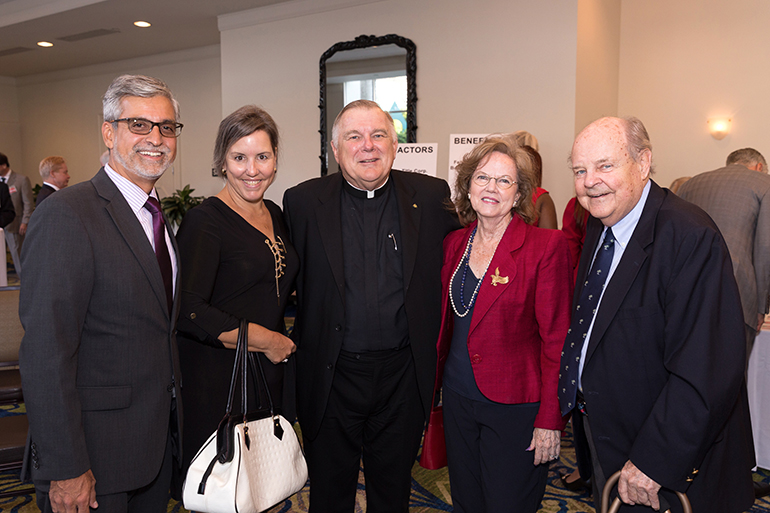
Photographer: TOM TRACY | FC
Richard Campillo, Karen Campillo, Anne James, and Bob James joined Miami Archbishop Thomas Wenski, center, at St. Anthony Parish in Fort Lauderdale for the 28th annual Red Mass of the St. Thomas More Society of South Florida.


Comments from readers